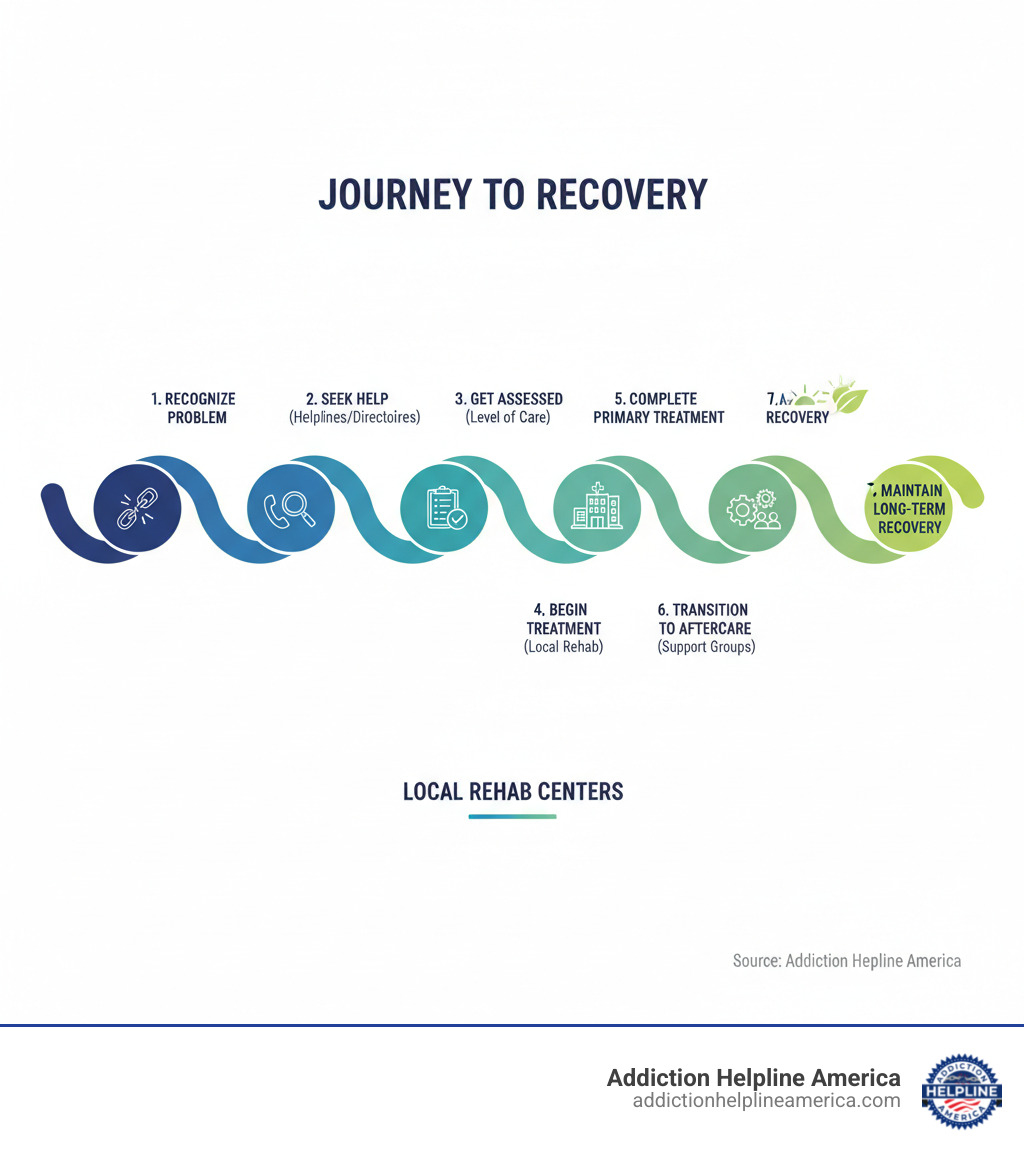
Why Finding the Right Local Rehab Center Matters Now
Local rehab centers are treatment facilities in your area providing medical detoxification, therapy, and support for individuals with substance use disorders. Here’s how to quickly locate one:
- Call a 24/7 helpline – SAMHSA National Helpline: 1-800-662-HELP (4357) or 988 Suicide & Crisis Lifeline
- Search online directories – Visit FindTreatment.gov to search by zip code
- Contact your insurance – Verify coverage and get a list of in-network facilities
- Reach out to state agencies – Your state’s Department of Health offers resources for state-funded programs
- Ask for referrals – Primary care doctors, community health centers, and local hospitals can guide you
The numbers are sobering: in 2023, 46.3 million Americans aged 12 or older had a substance use disorder. Yet in 2022, only a fraction of the 54.6 million people who needed treatment received it. Every day, more than 300 people die from drug or alcohol overuse.
This gap isn’t due to a lack of willingness, but often a lack of direction, feeling overwhelmed by options, or financial fears. But here’s the truth: recovery is possible, and help is closer than you think.
Understanding your local options is the critical first step. Treatment centers in every state offer various levels of care and payment options, including insurance, sliding fee scales, and state funding. This guide will walk you through finding and accessing local rehab centers, understanding treatment types, and navigating payment.
At Addiction Helpline America, we connect individuals and families with the resources they need to overcome addiction. Our mission is to provide confidential guidance so no one faces this journey alone.
Local rehab centers terms at a glance:
Decoding Your Options: Types of Local Rehab Centers and Levels of Care
Understanding the different types of local rehab centers and levels of care makes the path to recovery much clearer. This section will decode the addiction treatment world, explaining facility types, the stages of care, and specialized programs that can make a difference.
Understanding Local Rehab Centers
Local rehab centers are facilities in your community that help people overcome substance use disorders. They vary significantly in funding, services, and experience.
Nonprofit centers, funded by donations and grants, focus on accessible treatment over profit. Organizations like The Salvation Army often provide services at little to no cost, emphasizing holistic recovery through counseling and structured activities. While amenities may be basic, the care is focused and genuine.
Private facilities are for-profit centers that often provide a high-end experience with amenities like private rooms, gourmet meals, and holistic therapies. They feature higher staff-to-patient ratios for more personalized attention. Though costlier, many find the comfortable environment and intensive support valuable. We have more information about specialized rehab options.
Community-based or state-funded programs serve those with limited income or insurance. In exchange for low or no cost, they may have stricter eligibility and longer wait times. For many, they are a crucial lifeline when private care is unaffordable.
Here’s how these three types compare:
| Feature | Non-Profit Centers | Private Facilities | Community-Based/State-Funded Programs |
|---|---|---|---|
| Cost | Often low-cost or free for eligible individuals | Higher cost, typically covered by private insurance | Often low-cost or free for eligible individuals |
| Wait Times | Can vary; may have waiting lists depending on demand | Generally shorter, quicker admission process | Can have significant waiting lists due to limited funding |
| Amenities | Basic, functional, focus on core treatment | Luxurious, private rooms, gourmet meals, holistic therapies | Basic, functional, focus on essential treatment services |
| Staff-to-Patient Ratio | Moderate | High, allowing for more individualized attention | Moderate, focused on clinical needs |
There’s no single “best” option—only the best option for your unique situation.
Understanding the Continuum of Care
Recovery unfolds in stages, known as the continuum of care. Each level builds on the last.
Medical detox (withdrawal management) is often the first step. It provides 24/7 medical monitoring as your body withdraws from substances. This supervised process manages uncomfortable and potentially dangerous symptoms, preparing you for the next stage of recovery.
Inpatient or residential treatment involves living at a facility for 30-90 days. This immersive environment includes individual and group therapy, removing you from daily triggers to focus on healing and developing new coping skills. For those needing more time, we provide information on long-term rehab centers.
Partial hospitalization programs (PHP) offer intensive treatment for several hours a day, several days a week, while you live at home. It’s a step down from residential care or for those with a stable home environment needing significant support.
Intensive outpatient programs (IOP) provide structured therapy a few times a week, allowing you to maintain work or school. It’s a common step after PHP for gradual reintegration into daily life.
Standard outpatient care involves weekly or bi-weekly therapy sessions to reinforce skills and manage challenges. It’s suitable for less severe substance use disorders or as a final step before aftercare.
Your treatment team will help determine the right level of care for you, and you can move between levels as your needs change.
Specialized Programs and Medication-Assisted Treatment (MAT)
Some individuals benefit from specialized approaches that address specific circumstances.
Dual diagnosis treatment is for when substance use disorders co-occur with mental health conditions like depression or anxiety. These programs treat both simultaneously, addressing their complex, interwoven nature for more effective recovery.
Opioid addiction treatment programs address the unique challenges of opioid use disorder, including intense cravings and high relapse risk. If you’re struggling with prescription opioids, we offer guidance on Treatment for Percocet addiction.
Trauma-informed care creates a safe environment, avoiding re-traumatization. Staff are trained to understand how trauma impacts behavior and respond with compassion, recognizing that healing from both trauma and addiction must happen concurrently.
Medication-Assisted Treatment (MAT) is an evidence-based approach combining therapy with FDA-approved medications. Like medicine for a chronic disease, these medications reduce cravings and withdrawal, providing the stability needed to engage in therapy.
- Methadone eliminates withdrawal and blocks opioid effects. It is dispensed daily at specialized Opioid Treatment Programs (OTPs).
- Buprenorphine also reduces cravings and withdrawal with a lower misuse risk. It can be prescribed from a doctor’s office, offering more flexibility.
To locate facilities offering these treatments, you can Find Opioid Treatment Programs via SAMHSA’s directory. We also provide more on Medication Assisted Treatment to help you understand your options.
Your Roadmap to Recovery: Finding and Paying for Treatment
Finding the right local rehab centers and figuring out payment can feel overwhelming, but there is a clear path forward. We’re here to help you understand where to look, who to call, and how to make treatment affordable.
A Step-by-Step Guide to Finding Local Rehab Centers
Once you decide to seek help, the next steps are more manageable.
Your journey starts with an initial assessment by a clinician. They will discuss your substance use, mental health, and life situation to recommend the right level of care. This confidential conversation is about creating a personalized treatment plan, not judgment.
Online directories are invaluable tools. SAMHSA’s National Treatment Finder is a confidential, anonymous search tool that lets you filter by location, treatment type, payment options, and more. Many states also have their own directories, like Find help in Colorado for state-specific resources.
Sometimes you need to speak to someone immediately. Helplines like the SAMHSA National Helpline at 1-800-662-HELP (4357) and the 988 Suicide & Crisis Lifeline provide 24/7 support, information, and referrals to local resources.
Once you have a list of potential facilities, call them directly. Ask about their services, availability, admission requirements, and therapies offered. Preparing questions beforehand helps. Be ready to provide referral forms or medical records if needed.
How to Pay for Rehab: Insurance, State-Funding, and More
The cost of treatment should never be a barrier to getting help. More payment options are available than most people realize.
If you have private insurance, the Mental Health Parity and Addiction Equity Act requires most plans to cover addiction treatment. However, coverage varies, so it’s crucial to verify your benefits with your provider. An admissions navigator at a treatment center can often help with this process. For example, you can learn about Using Beacon Health Options Insurance for rehab.
Public insurance options are also vital. Medicaid covers treatment for low-income individuals and is accepted by many state-funded and some private centers. Medicare provides coverage for those 65 or older and certain people with disabilities.
If you’re a veteran, VA benefits offer comprehensive SUD treatment. Speaking with a Veteran Liaison can help identify what’s covered under your benefits.
Many facilities offer payment solutions. Sliding scale fees, based on your income, are common at non-profit and state-funded centers. Facilities may also offer payment plans or connect you with financing options to make treatment affordable. For more details, see our guide to finding rehabs in California.
Qualifying for Community-Based or State-Supported Programs
State-funded programs are a lifeline for many, but they have specific requirements.
Eligibility for state-funded programs typically requires proof of state residency, U.S. citizenship or legal status, and financial need (verified by income and lack of adequate insurance). These rules ensure that limited funds go to those who need them most.
Navigating waitlists can be challenging. High demand and limited funding often lead to waiting periods. Priority may be given to certain groups, like pregnant women. While waiting can be discouraging, it’s important to stay engaged with other support options.
While you’re waiting, use interim support. This can include outpatient services or free support groups like Alcoholics Anonymous, Narcotics Anonymous, and SMART Recovery. Your state’s Department of Health, such as Find help in Arkansas, is the best resource for finding these options.
Beyond Treatment: Essential Support for Long-Term Sobriety
Leaving a treatment program at one of your local rehab centers is the start of a new journey, not the finish line. The real work of building a sober life happens in the days and months that follow, and having the right support systems is crucial for thriving in recovery.
Immediate Help in a Crisis
In moments of intense craving, mental health crisis, or near-relapse, knowing where to turn for immediate help is critical. Crisis intervention services provide immediate stabilization during acute distress.
Key 24/7 resources include the 988 Suicide & Crisis Lifeline (call or text) and the SAMHSA National Helpline at 1-800-662-HELP (4357) for information and referrals. Local crisis hotlines, like Mississippi addiction hotlines, offer area-specific knowledge and can connect you to nearby resources quickly.
Save these numbers in your phone so they are ready when you need them.
The Role of Aftercare in Preventing Relapse
Aftercare isn’t optional; it’s the vital bridge between the structured environment of treatment and the complexities of daily life. It is a personalized plan for staying sober post-treatment, acknowledging that recovery is an ongoing process.
Continuing therapy, whether individual or group, provides ongoing professional support. This regular contact helps you manage challenges before they become crises and reinforces new, healthy behaviors.
Sober living environments are drug- and alcohol-free homes where residents support each other in recovery. They offer a middle ground with accountability and peer support while you practice new life skills. You can find more information on sober living to see if it’s right for you.
Developing relapse prevention skills is the heart of aftercare. This involves identifying triggers, building a sober support network, and creating a plan to manage cravings. It’s about having the right tools ready when challenges arise. Understanding what is rehab aftercare? helps you accept this vital phase of recovery.
Finding Your Community: Local Support Groups
Connection is a powerful force in recovery. While isolation fuels addiction, community nurtures sobriety.
Alcoholics Anonymous (AA) and Narcotics Anonymous (NA) are 12-step programs that offer meetings in nearly every community. They provide a space to connect with others who have similar experiences. Their accessibility means you can find an AA meeting or find an NA meeting almost anywhere.
SMART Recovery is a science-based alternative using cognitive-behavioral techniques for self-empowerment. Finding the approach that resonates with you is key to success.
Peer support specialists have lived experience with recovery. They are not therapists but offer invaluable guidance and perspective from someone who has successfully steerd the same path. Many local rehab centers and community organizations offer access to peer specialists.
At Addiction Helpline America, we know that combining professional treatment with strong community support is the key to lasting sobriety. You don’t have to do it alone.
Frequently Asked Questions about Local Rehab Centers
Starting the path to recovery brings up many questions. Here are some of the most common concerns we hear about local rehab centers, answered with clarity.
How do I know which level of care I need?
You don’t have to figure this out alone. The first step is a comprehensive assessment with a qualified clinician. They will discuss your substance use, mental and physical health, and home environment to determine the severity of the addiction and identify any co-occurring disorders.
Based on this, they will recommend a level of care. Severe addictions often require medical detox and residential treatment. Co-occurring mental health issues (dual diagnosis) need an integrated program that treats both conditions together.
Your personal circumstances, like work or family, also matter. Outpatient programs offer flexibility to manage these responsibilities during treatment. The final recommendation creates a plan that fits your life while giving you the best chance at recovery.
What is the average wait time for a local rehab program?
Wait times vary significantly. Private facilities often have shorter waits, sometimes just days, due to more resources. State-funded and community-based programs, on the other hand, typically have longer waitlists (weeks or months) because of high demand and limited funding.
Some programs give priority to certain groups, such as pregnant women or those with serious medical issues.
Waiting doesn’t mean doing nothing. While on a waitlist, engage with support systems. Attend daily meetings of Alcoholics Anonymous or Narcotics Anonymous, find a local counselor, or use interim services offered by some programs to stay safe and prepared for treatment. Your state’s Department of Health, like the one in Delaware, can provide guidance: Find help in Delaware.
Can my family be involved in my treatment?
Yes, and it’s highly encouraged. Addiction impacts the entire family.
Most local rehab centers offer family therapy sessions to help repair communication, rebuild trust, and set healthy boundaries. These sessions can be challenging but are often crucial for healing.
Facilities also provide educational programs for families. Loved ones learn that addiction is a disease and how to offer support without enabling, getting everyone on the same page for recovery.
Even in residential programs, structured visitation is typically encouraged to maintain and strengthen family connections. Support groups like Al-Anon and Nar-Anon also exist specifically for loved ones. Some facilities offer dedicated family counseling, such as Family Counsel and DWI Treatment Waynesville NC. Recovery works best when it includes the people who matter most.
Conclusion
Recovery from substance use disorder is happening right now for people who once felt lost. This guide has explored the landscape of local rehab centers, from accessible state-funded programs to specialized private facilities.
We’ve detailed the continuum of care, the role of MAT and dual diagnosis treatment, and the importance of aftercare in sustaining long-term sobriety. We’ve also provided practical steps for finding and funding treatment, because financial barriers should never prevent someone from healing.
While the statistics are stark—over 300 lives lost daily—there is hope. In 2024 alone, more than 151,000 people received the help they needed, proving that change is possible. Your story can be one of them.
Taking the first step requires immense courage, but it changes everything. It opens doors to a supportive community and starts the journey toward a life free from the weight of addiction.
Help is real, available, and closer than you think. Those local rehab centers are where futures get rewritten.
At Addiction Helpline America, we are that bridge. Our guidance is free, confidential, and personalized. We listen to your unique situation and connect you with the right resources from our vast network. You don’t have to do this alone. We’re here to simplify the process and help you find the right path.
Ready to begin? Let us help you find the best rehab program for you and take that courageous first step toward lasting recovery.
Our helpline is 100%
free & confidential
If you or someone you care about is struggling with drug or alcohol addiction, we can help you explore your recovery options. Don’t face this challenge alone—seek support from us.
Programs
Resources
Will my insurance
cover addiction
treatment?
We're ready to help
Find the best
drug or alcohol treatment
center
Are you or a loved one struggling with addiction? Call today to speak to a treatment expert.
















